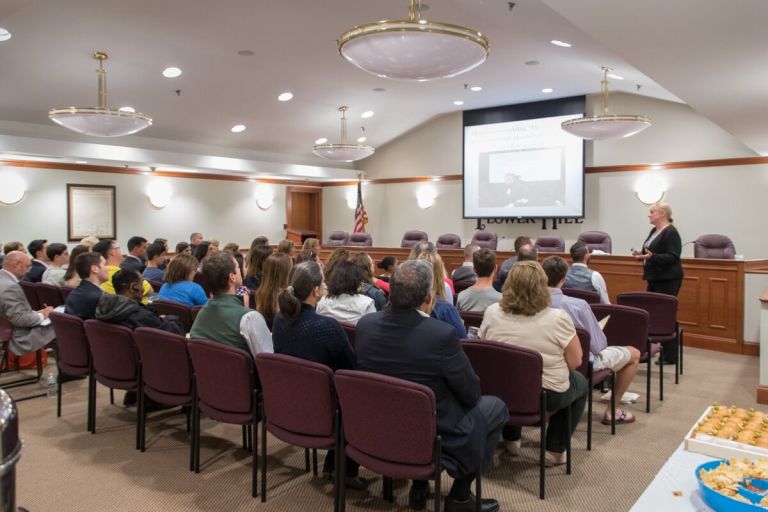
Thomas Ventura was a star athlete at Kings Park High School and dreamed of playing lacrosse in college, but a drug addiction cut his life short.
“We all talk about where addiction ends and mine ended terribly,” Thomas’s mother, Linda Ventura, told a packed Flower Hill Village Hall last Wednesday.
“We need to talk about where it begins,” she said. “And we need to as communities, we need to start putting prevention into place. We need to start empowering our kids at a young age with coping skills with the ability to communicate these types of feelings.”
Ventura was joined by Patchogue resident Nora Milligan, Nassau County Detective Pamela Stark, and Anthony Rizutto from Seafield Addiction Facility at a discussion on the rise of heroin and substance abuse on Long Island at an event hosted by the Village of Flower Hill, the Women’s Club of Flower Hill and Manhasset Casa.
Officials said the event was to encourage conversation, promote awareness and find solutions to a growing problem facing Long Island.
Ventura said on March 14, 2012, while on her way to work in New York City, she received the call that her 21-year-old son had died from a heroin overdose.
“My phone rang and it was my youngest son and I can still hear his voice in my head because it was chilling,” she said. “He was 18 years old and he found his brother in the bathroom dead from a heroin overdose and he is screaming ‘my brother is dead, my brother is dead, Thomas is dead,’ and I’m on the Long Island Rail Road.”
Ventura said that before her son became addicted to drugs he had bright future, played sports and enjoyed joking around with the family.
“He loved to tease his sister Jennifer and on one or more occasion tricked her into eating worms,” she said.
Ventura said the problems started after her children lost three grandparents and watched their parents get divorced – all within three years.
“That’s a lot of trauma for a kid going on the ages of 12 to 15,” she said.
Ventura said that because of the stress, her son started to self-medicate with marijuana and eventually turned to heroin.
“You could see the difference in him, I knew immediately,” she said.
Although her son attended several outpatient rehabilitation programs, several five-day detox programs and two 28-day inpatient programs, he was not able to beat his addiction, she said.
Ventura said that although she was monitoring her household, she was not able to control what her son was doing at other houses, which she feels happens often to children that become addicted to substances.
“We all have to start to community parent again,” she said. “We need to come back to caring about one another.”
To help share her son’s story, Ventura founded Thomas’ Hope, a nonprofit organization in Kings Park which promotes drug awareness, prevention and advocacy.
At the event, Stark said she’s noticed an increase in substance abuse cases around Long Island and that over the past few years the use of prescribed pain killers has gone up.
“I’m not going after all doctors, I’m just saying that I do know we have an epidemic here that is riveting our country,” she said.
Stark discussed a Long Island couple David Laffer and Melinda Brady who became addicted to pain killers.
In 2011, Laffer shot four people at Haven pharmacy in Medford on Father’s Day while robbing the pharmacy for prescription pills.
“I have to tell you, most people don’t get to that point but these people did, right here on Long Island,” she said.
Stark said that after this incident, people on Long Island started to take notice and realize that something had to be done.
Stark said Nassau County has programs in place to help people who are suffering from substance abuse. These programs include a statewide system for tracking prescriptions of controlled substances to reduce their misuse and diversion and to cut overdoses.
Stark said in addition to the program, all Nassau County police officers have been trained to use Narcan, a brand of the opioid overdose antidote naloxone hydrochloride, in response to a call involving an overdose.






